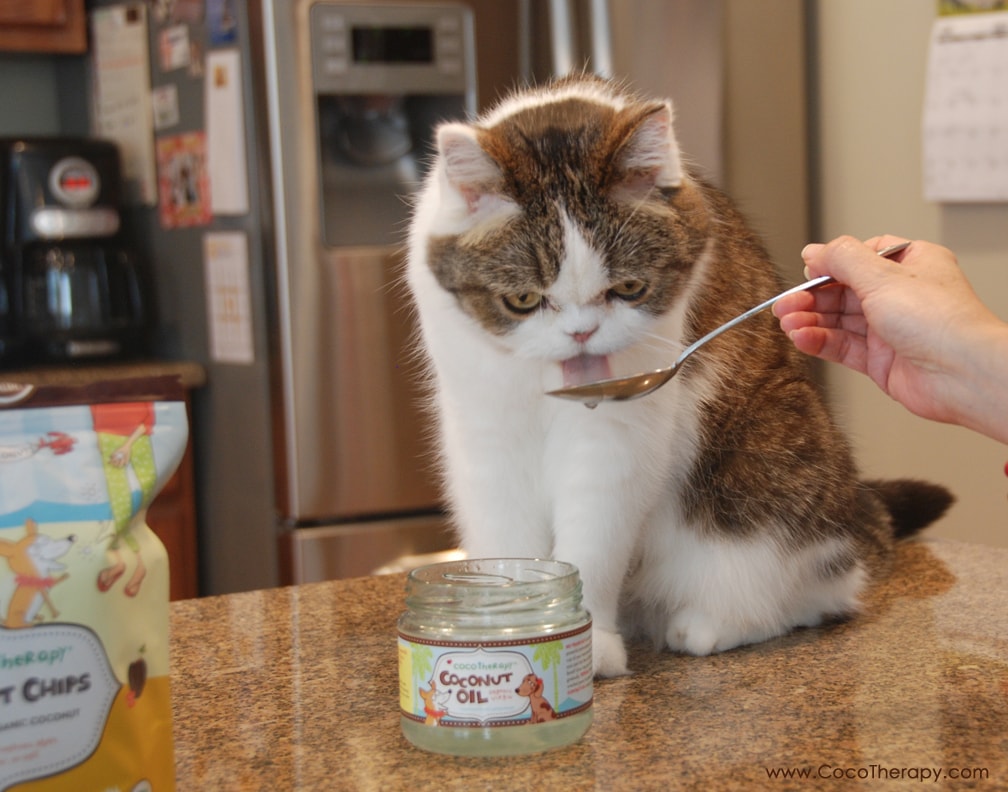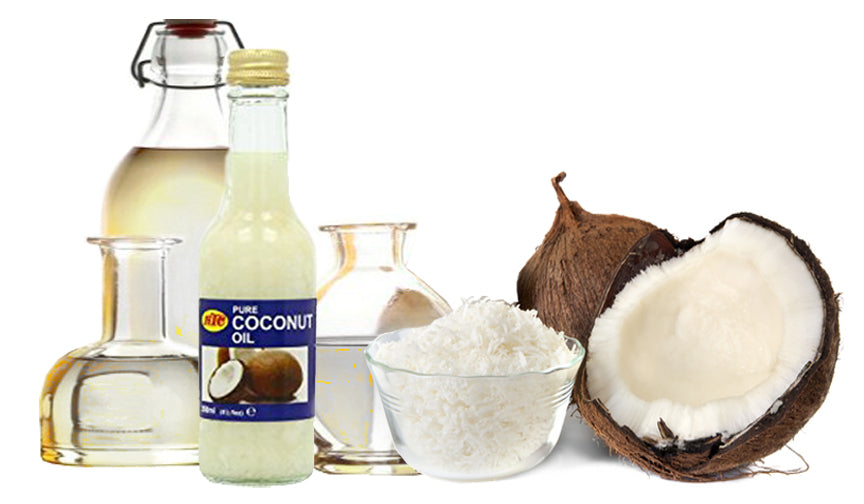There are many great reasons to use coconut oil with your pets, some of which we've covered right here on the blog. These include coconut oil's beneficial effects on the digestive system, its capacity to protect against pests and allergies, and its amazing impact on skin and coat health.
In today's post we'll take a look at a topic we're often asked about: the best ways to use coconut oil with your pets. Are you looking for practical ways to boost your pet's health and longevity with coconut oil?
Then read on to find out …
- Why choosing the right coconut oil is important
- How to safely introduce coconut oil to your pet's diet
- The recommended daily maintenance dose to support overall health
- 5 more simple ways you can use coconut oil to improve your pet's health
Choosing the Right Coconut Oil
In our recent blog post, Fake Oils: Virgin Olive Oils Can Fake It, and So Can Virgin Coconut Oils, we explored the problem of low-quality coconut oils that lack the health benefits of genuine virgin coconut oil.
Suffice to say, before you introduce coconut oil to your pet, make sure to choose a therapeutic-grade virgin coconut oil that's safe, unrefined, and packed full of the wonderful health benefits that make it a true "superfood." Using a therapeutic-grade coconut oil such as CocoTherapy ensures that your pet will get the most benefits from coconut oil.
If you need a quick recap of how to choose the best coconut oil, check out the "What to Look out For" section of the post.
Unlike its low-quality imitators, therapeutic-grade coconut oil is very stable and has a storage life of about two years - far longer than most other oils. Therapeutic-grade coconut oil has a very low moisture content, .06% or lower, and high Lauric Acid content, at least 53%. It can be safely stored in the kitchen cupboard and doesn't need to be refrigerated.
Introducing Coconut Oil to Your Pet's Diet
When first introducing your pet to coconut oil, start with a very small amount and increase gradually. Some pets - especially those not used to much fat in their diets - may need a while for their digestive systems to adapt. Coconut oil is a healthy fat that benefits the body in many ways, but too much too soon could upset your pet's stomach.
For most pets, the daily maintenance dose (more on that in a moment) should pose no problems. But it's advisable to feed half that amount at first, and slowly work up to the maintenance dose over a period of one or two weeks. Doing this ensures that your pet's digestive system has time to adapt.

Daily Maintenance Dosage of Coconut Oil
Coconut oil has antibacterial, antiviral, and antifungal properties. It's also a great source of medium-chain triglycerides (MCTs) which help support overall health. Feeding your pet a daily maintenance dose is the best way to take advantage of all the benefits coconut oil has to offer.
An adequate daily maintenance dose of coconut oil will vary according to the type of animal and its weight. Here are the recommended dosages at a glance:
- Carnivores and omnivores (like dogs and cats), 1 teaspoon (5g) per 10 pounds (4.5kg) of body weight
- Small herbivores such as hamsters and guinea pigs, 1/8 teaspoon (0.6g) per pound (450g) of body weight
- Large herbivores (like horses and sheep), 1/2 teaspoon (2.5g) per 10 pounds (4.5kg) of body weight
It’s important to note that virgin coconut oil is considered a natural food and not a supplement. Because of this, a specific “dose” is not necessary, and we often advise pet owners to give their pets the maximum oral tolerance, where they can see beneficial results. Every animal is different, two dogs of the same weight may require different amounts of coconut oil, depending on their overall condition and health.
Most pets love the taste of coconut oil, so you shouldn't have much trouble getting them to eat it! If your pet enjoys the taste, allow them to eat it whole - directly from your fingers or a spoon. If your pet's one of the few that don't like the taste of the oil, it can be easily mixed in with their food.
5 More Ways to Use Coconut Oil to Improve Your Pet's Health
Feeding coconut oil to your pet daily is a great way to support and maintain their health, but there are lots more ways to use this healthy, versatile oil. Here are 5 of our favorite ...
1) As a Moisturizer for Dry Skin
Coconut oil is great for moisturizing and nourishing skin from nose to tail. Massage a small amount of the oil directly onto affected areas.
2) As a Natural Pest Repellent
100% natural, human-grade coconut oil acts as an effective flea and tick repellent. It's a safe and natural alternative to powerful chemicals that risk the health of your precious pets. If you suspect that your pet has fleas, massage a generous amount of coconut oil onto the skin and hair of the animal, making sure to coat the skin well. Leave the oil on for at least 8 hours, then wash your pet with a natural, gentle shampoo.
3) To Heal Cuts and Scrapes
Coconut oil is an anti-inflammatory which speeds up the cellular repair processes in the skin. It also has anti-bacterial, antiviral and antifungal properties which prevent infection. Massage a small amount of the oil onto the injured area to help heal minor cuts and scrapes.
4) As a Natural Toothpaste
You can even use coconut oil to brush your dog's teeth! The simplest way to brush your dog's teeth is by applying a small amount of coconut oil to a moistened piece of gauze, then brush with gentle motions to clean the teeth and gums. Your dog will love the sweet taste of the oil, and the gauze will make the task of brushing a whole lot easier!
5) To Clear up and Control Ear Infections
Pets are susceptible to ear infections caused by bacteria, yeast and ear mites. Apply a few drops of coconut oil to your pet's ears each day to soothe itchiness, clear up infection, kill mites, and keep their ears clean and healthy.
Could your pet benefit from the healing power of therapeutic-grade virgin coconut oil? Find out why CocoTherapy coconut oil is the very best choice for your pet by checking out our reviews.
Do you have any questions for the CocoTherapy team? We'd love to hear from you in the comments!




